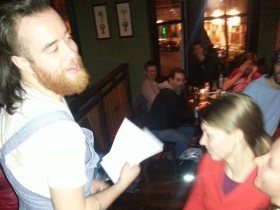Happy Cranksgiving
Milwaukee's fifth annual “Cranksgiving” sends cyclists on a race to donate to needy folks.
Just before one p.m. on a recent Saturday, a crowd of over 30 bicyclists milled around beside the Milwaukee River in Gordon Park in Riverwest. They were waiting to receive a manifest with nine addresses in the city of Milwaukee, where they were to pick up two non-perishable food items at each place.
The addresses led them to local grocery stores like Outpost Natural Foods, Koppas Fulbeli Deli and the Riverwest Co-op, and the non-perishable items were then be dropped off at the Hope House in Walker’s Point once the bicyclists had crossed off all their checkpoints.
Cranksgiving, an annual bike race held nationwide, celebrated its fifth successful Milwaukee race this month and donated over $600 worth of groceries to the Hope House food shelf, which then distributes it to needy families.
This year’s race was also a notable display of the power of collaboration between community members in Milwaukee. It marked the first collaborative effort between two major bicycle organizations in Milwaukee, the Milwaukee Bicycle Collective, a non-profit bicycle resource center and MKE BKE, a community group that throws bicycle events around the city.
On race day, Katie Curl and members of the Hope House’s Shining Stars youth program greeted bicyclists as they dropped off their loads in the community center’s front lobby. The Hope House is an emergency and transitional living and community center in Walker’s Point that provides services for homeless and low income individuals. In addition to its food shelf and living center, the Hope House has youth programs, G.E.D. prep and nutrition classes that teach attendees how to eat well on a budget.
Curl, the Hope House’s Communications and Development specialist, directed riders to place cans of tomato sauce, baby food and boxes of pancake mix, among other non-perishables, in giant trash receptacles and offered them bottled water and glasses of orange juice to fuel the three and a half mile dash to the finish line.
Just a few weeks ago, Curl stood up at a Walkers Point Association meeting and announced that the Hope House pantry was getting low on food. At the same meeting sat Carolyn Weber, a keyholder at the Milwaukee Bicycle Collective, who suggested that Curl consider getting involved with Cranksgiving. With only a few days before Thanksgiving, Curl says she’s excited to be a part of Cranksgiving, the Hope House’s first bike-related event. “We have a huge demand for food around the holiday season,” she says, and thinks the Cranksgiving race will raise awareness in the community about the food pantry.
Cranksgiving races benefit charities across the country, but they also play an important role in unifying communities of cyclists and their neighbors. For Milwaukee, the Nomad World Pub on Brady Street opened its second level as the final checkpoint for the event. Bikers and friends gathered there after the race rehydrating with two dollar PBRs, the proceeds of which were also sent to the Hope House.
Dean Donnelly, a local bike enthusiast, collected envelopes of receipts from participants finishing the race. Donnelly helped organize the race because, simply put, “he likes to see his community be awesome.” The receipts in the envelopes would not include purchases from Pick ‘n Save or Walmart. Instead, participants flooded local stores to collect their donations. Donnelly says that the organizers intentionally focused on local outlets because Cranksgiving is an event that should benefit the community. “The best rides are the ones with the best purpose.” he says, looking at the crowd of riders enjoying their victory PBRs, many of whom did not know each other before the race.
As with most MKE BKE organized events, free spoke cards were available to participants and guests. The spoke cards, small laminated cards that weave into bicycle spokes, symbolize the bond Donnelly attributes to “strangers who have a shared experience.” Donnelly says things like this bring community members together after the events have ended, noting that he’s sparked up conversations with strangers because of Riverwest 24 Hour Bike Race spoke cards.
After all of the participants turned in their envelopes Steve Roche, an MKE BKE associate, stood on a stool and addressed the racers. “ We did a really important thing here,” he says, “we raised a lot of food for people who need it, but we’ve also got some stuff for you awesome people.”
The prizes given away were provided by local businesses like Crankdaddy’s, the Tool Shed and Fyxation, an independent bike company. Associates of MKE BKE and the Milwaukee Bicycle Collective, as well as participants, all echoed the same sentiments however, that the prizes were second to doing good on their bicycles.
Carolyn Weber, of the Milwaukee Bicycle Collective, says that’s why everyone at the Nomad Pub received raffle tickets for additional prizes from the sponsors. “We’re really just trying to get people on the road having fun riding bikes.” Weber said collaborating with MKE BKE for the Cranksgiving event benefitted the community, but the Collective as well. The Collective, located on 29th and Clybourn was a checkpoint on the race, and many participants had never ventured to the shop before.
For Weber, spreading awareness of the Collective is wildly important. “We’ve got plenty of bikes,” says Weber, “but not a lot of help. Volunteers are our most valuable resource, they keep the shop open.”
The Collective offers parts and bicycles in exchange for volunteer work, classes that teach participants bike safety and maintenance and affordable bicycles for those that need them. She says that many people in that area don’t have cars so bicycles are a useful form of transportation; while a full-service bike shop couldn’t financially make it in a low-income neighborhood, a collective can work, she adds.
“I think cyclists can do a lot to show we care about the community,” she says, “that we don’t just run red lights. What’s really great is collaboration.”

















